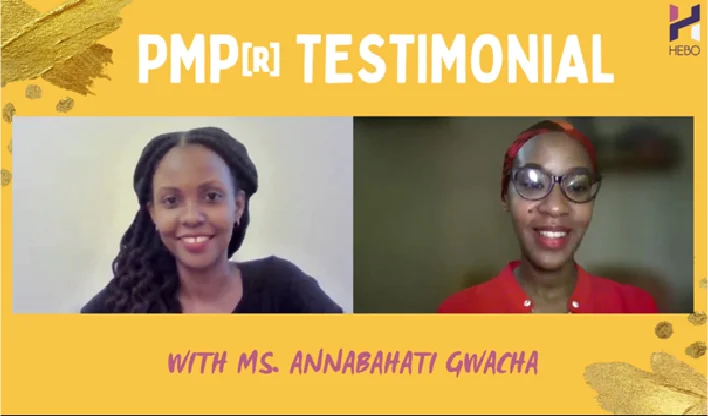For you to become a qualified global project practitioner, you need to be PMP certified– PMP, which stands for Project Management Professional certification is the leading global standard certification in project managers that is offered by the Project Management Institute, PMI.
Becoming PMP certified opens you up to cease project management opportunities around the world, grow your career as a project manager and be more confident as a credible professional in the field. The certifications give you that competitive edge that proves you work smarter. Make your goals a reality. Earn the PMP today
Passing the PMP Certification exam is not easy, but it takes a lot of dedication and hard work. As a PMP candidate, you are required to sit for the 4-hour PMP exam, which comprises 180 multiple questions, covering the three primary project domains (People, Process, and Business environment).
The PMP certification validates that you have the project leadership skills employers seek. The new PMP includes three key approaches:
- Predictive (waterfall)
- Agile
- Hybrid
Not all who take the PMP test succeed at the first try. This leads to most candidates dreading the exam and endlessly procrastinating the process of becoming certified.
Therefore, we had a chat with one of our candidates who got certified by passing the PMP exam on the first try, with AT (Above Target) score in all 3 domains, Ms. Annabahati Gwacha. She has been gracious enough to share her journey and hopes to inspire others to take the PMP exam
Annabahati Gwacha, a project manager at Africa Albinism Network has recently joined the list of Project Management Professionals (PMP) after passing her PMP exam.
She initially become aware of the PMP certification program by HEBO Consult through social media where she developed interest, and eventually started her journey in November 2020. She took online classes and performed practice and HEBO review tests in preparation for her PMP exam. It wasn’t an easy journey for her, but she made it through
In her words, she says
“Topic number 2 on processes was very heavy. A lot of things to gather, understand, connect, but it went by quickly, and I’m glad the class was very interactive, and the classmates were asking questions and sharing. I learned a lot, not just for the exam but also how projects practically run-in different industries from construction to health care to social projects”
She dedicated one whole month to studying fully before going for the PMP Exam. During that time, she undertook the HEBO assessments 3 times a week. Of course, there are days she missed the assessments! But, despite that, she still followed up with us to take those assignments and prepare herself for the PMP exam.
And after the assessment, she’d tackle every question that she got wrong. When her trainers shared the correct answers, she would compare what she thought with the correct answer to check her understanding of the concepts she learned.

Here are 9 tips that helped her PASS the PMP exam
1. Know the Reason Behind Taking the PMP Certification Exam
The reason why Annabahati sought the PMP certification is because she wanted to be on top of her project management game.
In her testimonial, she says,
“I wanted to know the professional practices that are worldwide acceptable, what are they? How can I be effective? How can I be more productive in my work? Initially, that’s what pushed me to seek PMP.”
What truly is the reason that you are taking this test? Discover it and lock onto it. You’ll need to revisit it throughout your journey to passing the PMP exam. Especially the moments when you’ll feel discouraged.
2. Study for Your PMP Exam with Curiosity.
They say curiosity kills the cat. Not in preparing for your PMP exams. To be able to understand the project management concepts, you’ve got to be curious to know and learn more than what you know about project management. Curiosity will motivate you to study.
When your curiosity is rooted in a firm desire to grow in the project management field, you have a firm foundation to pass your PMP exam.
3. Study to Understand
Before even thinking of learning the technical know-hows and methodologies of project management you must comprehend the whys behind every concept. It is the whys that will give you a strong foundation to apply the how’s. So, don’t cram for your test. Make sure you really understand the why behind all fundamentals.
According to a 2011 study conducted by Time.com, students who cram for tests and exams typically only pass their examinations with an average score. Additionally, most of the information gained through cramming sessions ends up being forgotten not just over a period of time but even during the actual test itself. (stanford.edu)
4. Have a Study Plan
Pay attention to yourself. Learn how best you learn. Some people love it when they are studying in a very quiet early morning over soft music, others enjoy night studying, while others can do either. Pay attention to what works for you and prepare a reasonable study plan in preparation for your PMP exam.
It’s also very important to take breaks during your study sessions. Research proves that it’s easier to remember the things you studied at the beginning of a session and at the end of it.
So, break down your long study sessions into short 30-40 mins sessions, and have a break in between. This will refresh your mind and give you new energy to learn and apply the concepts better in preparation for your PMP exam.

5. Take Practice tests.
To test how ready, you are for the PMP exam, you need to really practice. Attempt sample PMP questions, and time yourself as though you are doing the exam.
Or enrol on a PMP test simulator and see how well you score. Keep doing that until you are confident and satisfied that you have learned enough of the concepts to perform well in your PMP exams
6. Ask for Advice from PMP Certified Project Managers.
Look for other professionals who have recently passed. Give them a call and ask them how they did it. A little advice and mentorship will do no harm.
You might avoid a lot of pitfalls when you are open to learning from someone else’s success. After asking them such questions, apply what you believe will work for you and leave out what you think isn’t.
7. Have a Fresh Mind Before Your PMP Certification Exam
Ms. Annabahati chose to do the exam at night (at around 8 pm), and she says if there was something she’d change, it’s the timing. That’s because during the day, even though she tried to sleep, but because she was tense, she couldn’t. So, it’s best to pick a time when your mind is the freshest.
Take some time to rest before your exam to make sure your mind is rejuvenated and ready to take on the PMP Exam.
8. Manage Your Time Well.
Whether that’s during your preparation stage, or during the exam, you must manage your time well. Since you are a project manager, you should treat your PMP Certification as a project.
Break down the preparation days you have, know your objectives, know your goals and tasks and your overall strategy, and then work out your plan.
That also applies in the 4-hour PMP exam. How much time will you spend on every question? 60 seconds? 90 seconds? How much time will you set to review your questions?
Be very intentional with the time you have.
9. Trust Yourself
Do not allow yourself to fall into the fear hole. You need to tell yourself that no matter what, you are going to see this exam through, and you are going to pass. Do not allow anxiety or any negative thought to cloud your mind.
Take time to speak to yourself thoroughly and condition your subconscious mind by decreeing to it what you want to see throughout your preparation stage until your exams. And trust that you will pass your PMP exam.
If you want to learn more about the PMP certification and the training we offer, and perhaps take the journey to become PMP Certified, follow this link. To learn more about the PMP trainings that we offer.
For example, If you want to make your LinkedIn profile appealing, one of your tasks might be to watch a free course on LinkedIn marketing this Friday at 8 pm to learn how LinkedIn works so that you can optimize your profile in relation to the opportunities you are looking for.
4. GET AN ACCOUNTABILITY PARTNER
If you are really serious about achieving your goals, then, you need an accountability partner. An accountability partner is someone who will help you keep a commitment and will hold you accountable for your progress towards your goals.
He or she will challenge you to push through your limits, will keep you motivated, help you stay on track, and become a platform you can share your success with, and also gain support and advice. Choose someone who means business and can hold you accountable.
5. EVALUATE YOUR GOALS
Whether weekly or daily, be sure to set time to review your goals. Evaluate your progress to know what has been working and what hasn’t. This will allow you to restructure your goals in relation to the discoveries you make throughout the month or week.
You will not have everything figured out, and that’s okay. It’s a journey! Evaluation will help you keep a clear focus on where you’re going, and how you are getting there so that you can do more of what’s working and less of what’s not.

6. CELEBRATE YOUR ACHIEVEMENTS
When you have achieved a significant goal, make sure you celebrate.
Take yourself out, buy yourself something fancy, go to the movies, host a celebration, take a trip and spoil yourself. Rewarding and celebrating yourself will motivate and encourage you to work harder to achieve your ultimate goals.
Ultimately, the question, “Where do you see yourself in 5 years” covers more than the interview room. It’s a life question that demands a goal-oriented person. And If you follow the 8 things shared above then the next time you encounter this question, you’ll face it with ease.
7. CREATE A VISION BOARD TO STAY MOTIVATED WITH YOUR GOALS
It’s not every time that you will feel excited to work towards your goals. Sometimes you’ll feel demotivated or maybe even discouraged, and it is during these times that you need motivation.
One way of staying motivated is by creatively putting together a vision board that contains inspiring images of things, people, or experiences that best connect you with the vision of where you want to be, who you want to become, and the things you want to do. You can use Canva to create a good design to act as a wallpaper for your phone or your computer. This will remind you where you are going and why you are doing what you are doing.
8. DON’T PROCRASTINATE
Procrastination is the enemy of progress. Jim Rohn, one of the all time motivational speakers, once said, “We must all suffer from one of two pains: the pain of discipline or the pain of regret. The difference is discipline weighs ounces while regret weighs tons.”
About HEBO Consult
HEBO Consult is project management consulting firm that helps businesses, organizations, and individuals get the right skills, tools, and frameworks to successfully execute projects. Whether through consulting or training, we are committed to bringing you the right strategies, skillset, and mindset to turn your ideas into the best reality possible.
